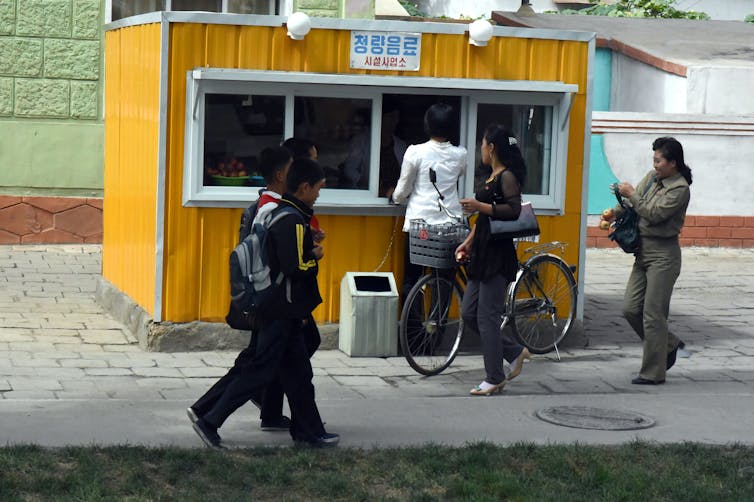North Korean women are now the breadwinners – and shifting this deeply patriarchal society towards a matriarchy.

Small shops, many run by women, are a common sight in North Korea. Lesley Parker
High heels, lace and handbags. In recent decades, there’s been a huge shift in the role of North Korean women and the choices they’re able to make – including what they wear.
In this episode of The Conversation Weekly podcast, we hear about new research on how North Korean women are driving a new form of grassroots capitalism, and changing the country in the process.
“It’s a salutary lesson to all patriarchies. You shouldn’t take your eye off the women,” says Bronwen Dalton. She’s head of the department of management at the University of Technology Sydney Business School in Australia and a co-author, with her colleague Kyungja Jung, of a new book on the role of women in North Korea.
Their research was based on conversations with 52 North Korean defectors living in South Korea and China, as well as insights from three trips Dalton took to North Korea.
North Korea is a deeply patriarchal society, and women have traditionally been defined by two words: mother and wife. But when famine hit the country in the 1990s and the public food distribution system disintegrated, it was left to women to try to earn money to feed their families. And the state, obsessed with controlling the lives of men, mainly ignored what women were doing.
Many began working in markets, some of which were legal, some illegal, selling what they could to supplement the meagre wages of their husbands’ factory jobs.
With this shift, it became a whole new lexicon that was derogatory around men, because the economic power had shifted. Women are the breadwinners in a very tight economic times, and men were another mouth to feed.
Jung was fascinated when North Korean defectors she interviewed used the word matriarchy. She related one conversation with a woman in her 50s.
She stated that women often say the patriarchy has fallen in favour of the matriarchy … And if women were once under their husband’s thumbs, men are now afraid they will be kicked out of their homes by their wives.
At the same time, women’s fashion choices have shifted to become more hyper-feminine. Dalton says that North Korean women will do “anything to obtain a pair of high heels”, and they wear a lot of bling, lace and embroidered parasols.
 Two sides of North Korea: fashion and loyalty to the state. Lesley Parker
Two sides of North Korea: fashion and loyalty to the state. Lesley Parker
Listen to The Conversation Weekly podcast to hear Bronwen Dalton and Kyungja Jung talk about their research on North Korea, plus an introduction from Justin Bergman, international affairs editor at The Conversation in Australia.
A transcript of this episode will be available shortly.
This episode of The Conversation Weekly was written and produced by Gemma Ware and Mend Mariwany, with assistance from Katie Flood. Sound design was by Eloise Stevens, and our theme music is by Neeta Sarl. Stephen Khan is our global executive editor, Alice Mason runs our social media and Soraya Nandy does our transcripts.
You can find us on Instagram at theconversationdotcom or via email. You can also subscribe to The Conversation’s free daily email here.
Listen to The Conversation Weekly via any of the apps listed above, download it directly via our RSS feed or find out how else to listen here.![]()
Gemma Ware, Editor and Co-Host, The Conversation Weekly Podcast, The Conversation
This article is republished from The Conversation under a Creative Commons license. Read the original article.

